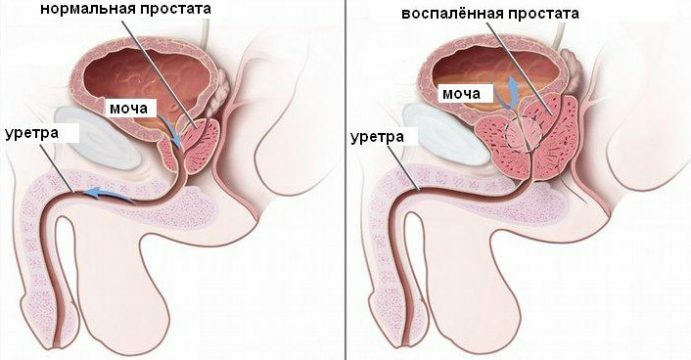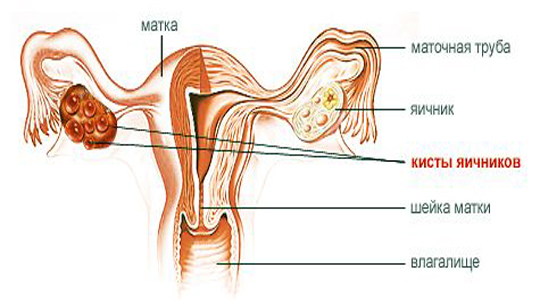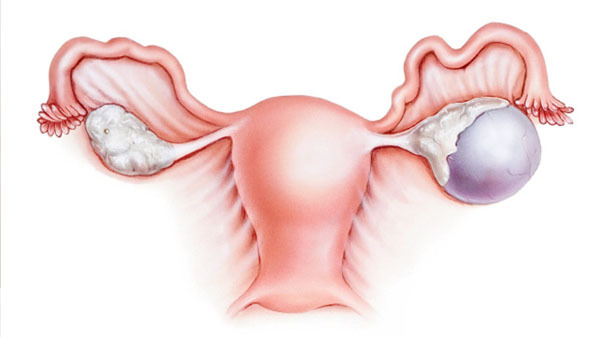Prostatitis is only a male disease. This is the process of inflammation of the genitourinary system, it begins with getting into it an infection. Every third man is sick of them. The disease begins at the age of 25-30 years, and the more age, the higher the risk of getting sick. From this inflammatory process it is difficult to recover, if you start the disease, it can lead to infertility.
Proportion of bacterial prostatitis among all forms of the disease:
- Acute form occurs in 5-10% of affected men.
- Chronic form occurs in 7-12% of the affected men.
Variety

There are two types of disease: chronic and acute.
Acute form of prostatitis occurs when the causative agent( infection) enters the prostate gland. It comes from inflammatory foci near it along the vessels. Some pathogens are always in the body of a healthy person, but only getting into the gland, they become the cause of the disease.
To pathogens of prostatitis include the following microorganisms:
- sticks blue and intestinal,
- staphylococcus aureus and enterococcus,
- proteus,
- klebsiel,
- enterobacter,
- seriation.
The acute form of the disease is infrequent, but no one is protected from it. If a man leads an unprotected sex life, has different partners, has suffered a disease with sexually transmitted diseases and his immunity is weakened, he is at risk. Infection enters the body through the urethra, with blood through the vessels, through the lymphatic connections and the rectum.
Symptoms of
Suspecting problems with the prostate gland allows the following symptoms:
- body temperature increase,
- chills,
- urination problems,
- pain, burning and burning with bladder emptying,
- frequent toilet rides,
- inability to completely empty the bladder,
- white highlighting from the urethra,
- severe pain in the perineum and groin.
If treatment is wrong or untimely, then the acute form will pass into the chronic.
Chronic form

Chronic bacterial prostatitis is harder to cure. He can flow without any symptoms, only reminding himself of painful sensations during urination. In the gland there are always infectious pathogens of the disease, they are not suited to the action of antibacterial drugs and antibiotics. Therefore, the treatment of bacterial prostatitis is often delayed for many months.
Inactive lifestyle, sedentary work, drinking alcohol and smoking, regular hypothermia with prostatitis can contribute to the emergence of a chronic form of the disease. Symptoms of acute and chronic forms differ.
Symptoms of chronic prostatitis:
- back pain, groin, crotch and lower abdomen,
- pain in urinary output,
- full bladder sensation,
- decreased libido,
- inability to achieve orgasm and ejaculation,
- pain in the groin area with sexual intimacy.
Chronic bacterial prostatitis is often accompanied by inflammation of the urogenital system due to the permanent presence of infectious microorganisms in the prostate gland.
To promote the appearance of the disease, poor blood circulation can occur. At risk are men who:
- use catheters to remove urine from the body,
- does not deal with infectious diseases of the genitourinary system,
- does not use condoms for anal sex,
- is sick with phimosis,
- underwent surgical and therapeutic interventions in the genito-urinary organs,
- wear tight clothes and underwear,
- allow frequent bladder overflow,
- is often supercooled,
- Abuse alcohol, spicy food and smoking.
Diagnosis

If the first symptoms appear, you should consult a urologist. If the doctor diagnoses acute or chronic bacterial prostatitis, it is necessary to immediately begin treatment with drugs that the doctor will appoint.
Acute form is easy to recognize because of its symptoms and pain. For more information, you need to donate blood and urine to the study. With their help they will determine which microorganisms are the causative agents. To check the neighboring organs for inflammatory processes, ultrasound examination and tomography are prescribed.
Chronic bacterial prostatitis is more difficult to diagnose due to the lack of constant symptoms.
It is defined in several stages:
- The doctor determines the nature of the disease.
- The abdomen and genitals are examined.
- Prostatic palpation through the rectum is used.
- Urine, secretion and blood tests are taken.
- The doctor may prescribe an ultrasound examination.
In most cases, the information obtained is sufficient for the diagnosis and selection of medications. If there are difficulties, then appoint additional examinations.
- Cystoscopy. Using a special device inserted through the penis, identify foci of inflammation in the urogenital system.
- Ultrasound and MRI.The ability to detect stones and cancer in the genitourinary system if they are available.
- A urodynamic examination is performed to determine the effect of the disease on the ability to urinate.
- Biopsy. To exclude or confirm the presence of cancer cells in the prostate.
Treatment of

Treatment of prostatitis takes a long time. The average duration of the course for the acute form is 1 - 1.5 months, and for the chronic form 1 - 3 - 6 months. Complex treatment consists of medications and physiotherapy procedures. Warm baths and prostate massage can be used only in chronic form. In acute, the effects on the prostate gland are prohibited.
The patient needs to change his lifestyle, move more, eat healthy foods and sex life regularly with one sexual partner.
There are cases when the treatment does not bring the desired results, but only suppresses the symptoms. Then the doctor suggests doing a transurethral resection. During this operation, the patient is partially removed from the prostate gland. This can lead to impotence, infertility and urinary incontinence, so it is offered to people if it is not possible to carry out the treatment in other ways.
It is important to follow the recommendations of the doctor, start treatment in a timely manner, take regular medications and not discontinue the course of therapy. This will allow you to avoid complications.
Complications of
If a symptom does not contact a doctor and does not begin treatment, then complications will begin. Often this is manifested by an abscess, in which the body temperature rises. He quickly passes into the swelling and prevents the urine from the body. Sometimes there is a blood poisoning - sepsis.
Sometimes complications such as:
- inflammation of the seminal vesicles,
- inflammation of the testes,
- formation of the fistula of the prostate,
- due to pain arise nerve disorders,
- sclerosis of the prostate,
- formation of cysts and stones in the gland,
- adenoma of the gland.
In order to prevent the occurrence of complications, which are more difficult to treat, it is necessary, at the first symptoms, to contact the urologist as soon as possible. A person will be given an accurate diagnosis, will conduct tests and write out the necessary treatment. It is necessary to strictly follow all the doctor's recommendations. And if the symptoms return, immediately report this to the urologist.



